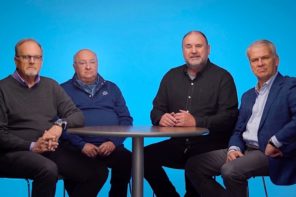I’ve been watching and listening to a steady stream of commentating from the New York Times to NPR to the Christian radio airwaves: everyone is talking about Glenn Beck’s reinvention as a nondenominational religious leader. His one hour address at Saturday’s “Restoring Honor” event on the national mall (which drew about 90,000, not 300,000) was no evangelical fire-and-brimstone call to repentance, but a classic Mormon-style testimony complete with tears. Glenn Beck has remade himself as America’s first Mormon televangelist.
Of course self-reinvention is key to the survival of any media figure: just ask Madonna. And his latest move from connect-the-dots-conspiracy-theorist to ecumenical revivalist seems to be working for Beck.
Part of what’s fueling the new surge of talk about Beck is the fact that he has cannily plugged right into a thorny theological issue: the question—important to evangelical Christians—of whether Mormons are actually Christians. A Pew Forum survey in 2008 showed that fewer than 50% of evangelical Christians thought so. In the last few days, talk shows and blogs have been abuzz with the same question. Yesterday, on NPR’s All Things Considered, Richard Land of the Southern Baptist Convention could barely disguise the disgust in his voice when he weighed in on Beck’s Mormonism, stating that the most “charitable” thing he could say about Mormons was that we were not Christians but “a fourth Abrahamic faith.”
But rather than stop and worry about the chatter, Beck is cashing in on it, as evangelicals (even those with scruples about his Mormonism) continue to deliver audience. And the thing about being a televangelist is that unlike an actual religious leader, Beck has no actual pastoral responsibility for the care of souls, and that unlike an actual elected official, Beck has no actual responsibility for devising practicable solutions to incredibly thorny problems like financial market meltdowns, runaway health care costs, or ending the costly and ill-conceived wars in Iraq and Afghanistan. Yes, it is in fact easier to pray on your knees (as Beck exhorted his audience Saturday) than it is to wrap your head around credit-default swaps.




